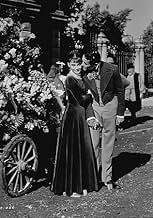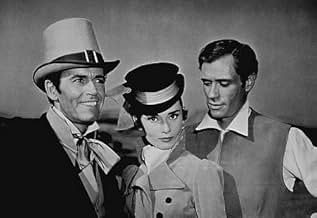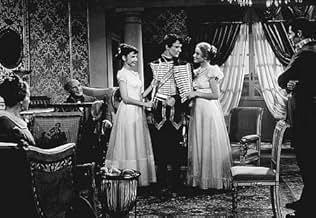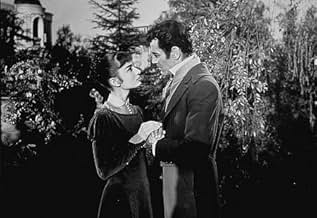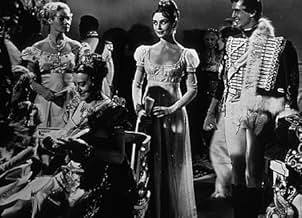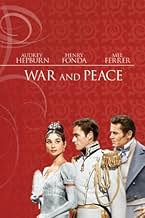La relación agitada de Napoleón con Rusia, incluida su desastrosa invasión de 1812, sirven como escenario para las complicadas vivencias personales de dos familias aristocráticas.La relación agitada de Napoleón con Rusia, incluida su desastrosa invasión de 1812, sirven como escenario para las complicadas vivencias personales de dos familias aristocráticas.La relación agitada de Napoleón con Rusia, incluida su desastrosa invasión de 1812, sirven como escenario para las complicadas vivencias personales de dos familias aristocráticas.
- Dirección
- Guionistas
- Elenco
- Nominado a 3 premios Óscar
- 6 premios ganados y 13 nominaciones en total
- Prince Bolkonsky
- (as Wilfred Lawson)
Opiniones destacadas
Anyway, War and Peace is a most worthwhile film experience for Vidor and Cardiff's Technicolor Vistavision visuals, for the screenplay which is often quite beautifully written, and for many fine performances from some exceedingly charismatic film actors, especially the astonishing Audrey Hepburn. There are close-ups of her that will make your heart stop.
The movie does suffer from two undeniable shortcomings. First is the atrocious sound recording that has blighted virtually every Italian movie ever made. As some of the comments have noted, movies shot at Rome's Cinecitta had their sound post-dubbed rather than recorded on the set. But actually, this practice was then (and remains) very common. The sound in Italian movies stands out simply because they were so bad at it. The brutal truth is, even the greatest masterpieces of Fellini, De Sica, Rosselini, etc. are less than they might have been because Italian sound technology was so slipshod. And so it is with WAR AND PEACE: it's hard to suspend disbelief when soldiers struggling across a river sound like someone dropping quarters into a toilet.
The other shortcoming is the appalling miscasting of Henry Fonda as Pierre Bezhukov. It's the worst performance of his career, and he looks and sounds about as Russian as a slice of pumpkin pie. One commenter here said Alec Guinness should have played Pierre. It's an intriguing suggestion, and of course Sir Alec was always good. Even better, I think, would have been Peter Ustinov. In 1956 he was Pierre to the very life.
But the rest of the casting is genuinely inspired. Oskar Homolka as Gen. Kutuzov, Barry Jones as Count Rostov, Jeremy Brett as Nikolai, Herbert Lom as Napoleon -- all could hardly be improved upon. And Audrey Hepburn was simply born to play Natasha. And Mel Ferrer as Prince Andrei ... well, he did have his faults as an actor (to say the least!), but at least he looked the part.
Beyond that, the movie has lavish production values, impressive battle scenes, and one truly great and powerful sequence, the French Army's disastrous retreat from Russia, that takes up much of the last hour.
There's no substitute, of course, for reading the novel (I've read it three times myself). But this 1956 movie makes a worthy introduction, and even helps to keep Tolstoy's complex plot straight when you do get around to reading it.
There are flaws. The script, though a model of clarity (unlike most literary adaptations, which concentrate on all the big set-pieces, creating narrative confusion), but short on inspiration. There is a dispiriting, unimaginative reliance on voiceover, and unnecessary soliloquys. The whole thing also goes on way too long.
Mel Ferrer is, without doubt, the worst actor in the world; he plays the dashing, tragic Prince Andrei with all the vigour of a mouldy plank. His part is pivotal, narratively, thematically and symbolically, so he features in a lot of scenes where his monotonous lack of expression makes the film stop dead. Henry Fonda, in many ways ideal as the Tolstoy altar-ego Pierre, who must move morally from observer to actor, is frequently defeated by the terrible dialogue, making this wonderful actor seem clumsy and amateurish. (Herbert Lom, however, manages to suggest great humanity behind the hammy pomp of Napolean).
I only mention these faults to show that the film's critics have their point. I also suggest that WAR AND PEACE is nearly a masterpiece for two reasons. King Vidor, whose work I'm largely (and shamefully) unfamiliar with, directs this film with awesome, authoritive lightness of touch. He pays respectful lip service to the big Tolstoyan themes, focusing particularly on families, the relations between parents and children, old traditional reactionary Russia, and the tentative, youthful impulse towards freedom.
I say lip-service, because his main interest in the film lies elsewhere. It lies in the expression of the emotional life of his characters. For although the film is a massive historical epic, it works best as a domestic melodrama. Characters, who can't express themselves in this hierarchical society, are allowed a voice through the film's direction, which forsakes literal realism, to tell us what is going on in their heads (and hearts). Exaggerated colour and carefully contrived composition offer us a second, more subtle and personal story, to the main, surface narrative. This might make WAR AND PEACE a more right-wing work, ignoring the processes of history and the plight of the serfs, in favour of sympathising with a caste of slave-owners, but Hollywood was never very good at socio-economic analyses.
Vidor's other great theme seems to be nature, and man's relation to it. He has little interest in invoking a real nineteenth century Russia; his Moscow is as exquisitely artificial as Sternberg's THE SCARLET EMPRESS, and his use of architecture and space to both show the distances between people, and the the fathomless emptiness of the soul, is positively Antonionian. With the natural world, however, there is a real feeling, beyond mere backdrop scenery, that is unthinkable in any contemporary Hollywood film. Primarily a movie about people and history, it is eternal nature that watches on, the battles, deaths, retreats. Indeed, it is nature that saves the Russian people, in the face of massive military odds, and it is nature that frames the melancholy, yet hopeful, resolution. (It's also interesting to ask why, at the heighth of the Cold War, Hollywood should decide to make a great Russian epic? To tastelessly evoke a 'glorious' pre-Soviet past? Or to enjoy the razing of Moscow to the ground?)
The second reason to love this film is, of course, the incomparable, beautiful, Audrey Hepburn. She is so right as Natasha (when I read the book as a kid, I pictured Audrey all the way through, without even knowing she had played her on film), the saviour of the book, as well as the film. It is one of the great performances - its modernity and truth blows away the dusty period conventions (indeed, at her first ball, she is as moving as a 50s teenager at her prom). Her intelligence, insight, passion (and she is a lot more erotic in this film than her supporters ever give her credit for) and grace are perfectly in tune with Vidor's conception, and her scenes have an extraordinary emotional force. She is the life of the film, and its moral centre in the absence of a convincing Pierre. The film plods to a slow death without her. The film essays three moral developments - Natasha's, Pierre's and Andrei's, but hers is the most moving and tragic. The change to sadness and understanding of the once gay and vivacious Natasha seems a terrible loss.
¿Sabías que…?
- TriviaAudrey Hepburn's character was supposed to be thirteen when the movie begins. She was twenty-seven when this movie came out.
- ErroresThe marching band in the opening parade are all playing modern musical instruments.
- Citas
Prince Andrei Bolkonsky: There must be something you want to do.
Pierre Bezukhov: I want to discover... everything! I want to discover why I know what's right and still do what's wrong. I want to discover what happiness is, and what value there is in suffering. I want to discover why men go to war, and what they really say deep in their hearts when they pray. I want to discover what men and women feel when they say they love.
- Créditos curiososClosing credits epilogue: The most difficult thing - but an essential one - is to love Life, to love it even while one suffers, because Life is all. Life is God, and to love Life means to love God. Tolstoy "WAR and PEACE"
- Versiones alternativasTwo different versions of the main titles exists. Both of them in English. In the one, the credits are set against a neutral background, in the other against details of a painting of Napoleon in front of his troops.
- ConexionesEdited into La magnífica aventura de Bill y Ted (1989)
Selecciones populares
- How long is War and Peace?Con tecnología de Alexa
Detalles
- Fecha de lanzamiento
- Países de origen
- Sitio oficial
- Idiomas
- También se conoce como
- War and Peace
- Locaciones de filmación
- Productora
- Ver más créditos de la compañía en IMDbPro
Taquilla
- Presupuesto
- USD 6,000,000 (estimado)
- Total a nivel mundial
- USD 24,874
- Tiempo de ejecución3 horas 28 minutos
Contribuir a esta página



